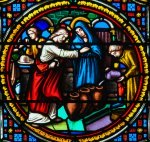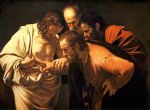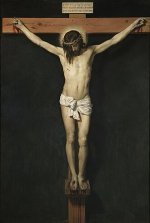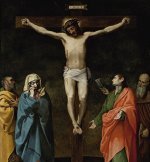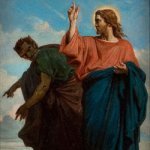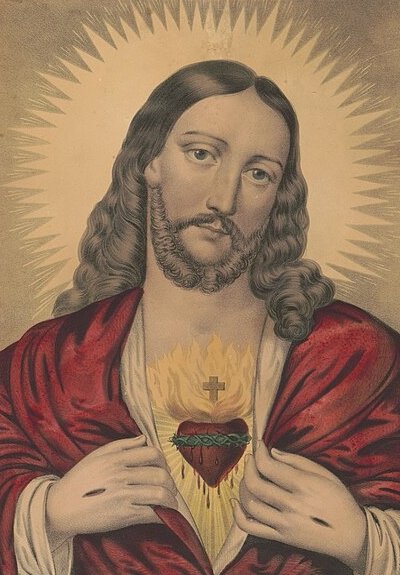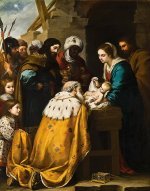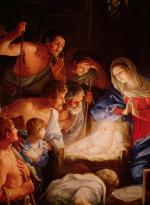SOMETHING SO BIG FROM SOMEONE SO SMALL!
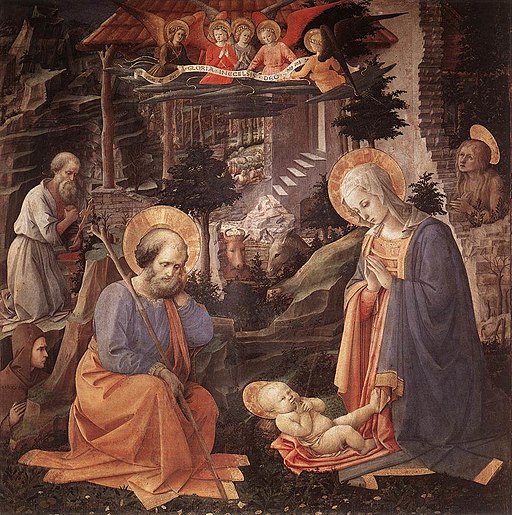
THE FIVE FIRST SATURDAYS IS A DEVOTION NEEDED NOW MORE THAN EVER! FIND OUT MORE HERE
THE SAINT MICHAEL PRAYER AND THE ROSARY
ARE ALSO POWERFUL PRAYERS TO HELP US THROUGH THESE VERY TURBULENT TIMES!
ANXIOUS ABOUT THE FUTURE? JOIN IN
THE MARY'S MANTLE CONSECRATION TAKING PLACE FROM JULY 1ST-AUGUST 15TH, 2025!
HIGHLY RECOMMENDED! DELIVERANCE PRAYERS,
A BOOK FROM SENSUS TRADITIONIS PRESS
(A GREAT PUBLISHER HELPING US FIGHT OUR MANY SPIRITUAL BATTLES NOWADAYS)!
CHECK OUT OUR PODCAST PAGE AND OUR YOUTUBE CHANNEL FOR INSPIRING CONTENT
THIS WEBPAGE IS AVAILABLE
AS A PODCAST HERE
In this day and age when so many people find themselves in quite difficult, uncertain circumstances from the pandemic and its economic fallout from the vaccine mandates, supply chain crises and such, this is a good time when looking at empty shelves in stores to allow someone in to help fill the emptiness many of us are feeling these days in our hearts! Jesus Christ!
He was born the King of Kings and Lord of Lords, the Son of God, our Redeemer and Savior in the magnificent Temple in Jerusalem in a splendid setting with the High Priests and citizens everywhere singing great Hosannas to His Name! Everyone in the Mighty Roman Empire bended their knees, figuratively and literally, to adore the newborn King with great fanfare! Oh..wait a minute...that’s not how it went at all... was it?
True, there were angels to spread the word to shepherds, and a star in the sky to give the announcement to the Magi (whom we traditionally associate with three kings). Both groups of men made their way to do Him homage to be sure…. but in a cave being used as a stable in Bethlehem, in a backwater region of the Great Roman Empire called Judea in Palestine. His Nativity didn’t even take place in an inn!
Archbishop Fulton J. Sheen, in his wonderful biography of Jesus entitled The Life of Christ, noted the strikingly humble circumstances surrounding our Lord’s birth. He wrote that an inn is: ”the rendezvous of the worldly, the rallying place of the popular and the successful. But the stable is a place for the outcasts, the ignored, the forgotten. The world might have expected the Son of God to be born—if He was to be born at all—in an inn.”
While the fact that the Christ Child was welcomed by shepherds and Magi shows us He was meant to be adored and worshipped from the lowly to the highest among us, it was in quite a destitute setting. Baby Jesus had a feeding trough for animals for a crib, as we sing in the famous Christmas carol Away in a Manger.
How could something so Big, as our Salvation, come from someone so small? So fragile and vulnerable? What was God trying to tell us to assume our humanity in such a state?
His Blessed Mother, and by extension ours as well, as we read in John’s Gospel (John 19:26) gave us a thoughtful answer in The Mystical City of God, a great book of church-approved private revelations Mary gave to Ven. Marie of Agreda in the 17th century. As she told the abbess, who was the head of a convent of nuns in Agreda in Spain:
Who would be so hardened as not to be moved to tenderness at the sight of their God become man, humiliated in poverty, despised, unknown, entering the world in a cave, lying in a manger surrounded by brute animals, protected only by a poverty-stricken Mother, and cast off by the foolish arrogance of the world? Who will dare to love the vanity and pride, which was openly abhorred and condemned by the Creator of heaven and in his conduct? No one can despise the humility, poverty and indigence, which the Lord loved and chose for Himself as the very means of teaching the way of eternal life.
And what would this little baby say some thirty years later after a life mostly hidden from us as the carpenter Joseph’s son? “Whoever would be great among you must be your servant” (Matt 20:6). And of course, let's not forget His famous saying “Whoever exalts himself will be humbled, and whoever humbles himself will be exalted” (Matt 23:12; Luke 14:11).
This is not to say Christ did not know He was. After all, He referred to Himself as “I Am”, signifying His being one with God as God, which scandalized the Pharisees (John 8:58). He also called Himself in the book of Revelation the Alpha and the Omega in several chapters (1:8, 21:6, and 22:13).
Rather He desired then, and, being outside of our earthly conception of time, still very much desires now, to show us how much He valued being of humble service to others as the very essence of Divine Love.
His two great commandments provide a stirring abridgment of the Ten: As He told a lawyer questioning Him as to which is the great commandment in the law "You shall love the Lord your God with all your heart, and with all your soul, and with all your mind. This is the great and first commandment. And a second is like it, You shall love your neighbor as yourself” (Matt 22:37-39).
Note that only in truly loving and serving God the way He wants us to can we then love others the same way, not in a selfish, egotisitical manner, but as His adopted sons and daughters, reflecting His love and goodness in how we treat others.
Humility also teaches us not to bear grudges while bearing crosses, which is admittedly a difficult task but one that is made easier by asking Our Lord for his help and by staying close to Him in prayer and in the sacramental life!
It is one of those great mysteries in our faith that God, born in a cave and then despised on the cross in His earthly ministry, could become God Glorified. Jesus made the ultimate sacrifice of His life to reopen the gates of Heaven for us after having established His church on earth for our earthly pilgrimage to Eternal Life.
As our Lord said this was a church over which the gates of hell would not prevail (Matt 16:18). This is a thought we very much need to keep in mind especially nowadays, like a lamp shining in a dark place, a wonderful image St. Peter once used referring to authentic Divinely inspired teaching (2 Pet 1:19).
As for our Blessed Mother, think of her in the Nativity pondering it all in her heart (Lk 2:19). Such is her humility that she has shown us her great love and devotion for her Divine Son over the centuries in church-approved private revelations without even a trace of resentment over not being given more verses in scripture describing her feelings and thoughts.
Those would come much later in those revelations such as in the example quoted earlier. Her two main maxims in the Gospels are stirringly sufficient in many ways, however. The first is from her fiat in which she gave her willing assent to the Angel Gabriel to be the mother of our Lord “I am the handmaid of the Lord. Let it be done to me according to thy word” (Lk 1:38). The second one covers her last words in Scripture in John’s Gospel at the Wedding Feast of Cana to the attendants ‘Do whatever He [that is Jesus] tells you” (John 2:5).
While Mary herself would describe her great joy at being the mother of our Savior, as we read in a great compilation of church approved revelations entitled The Life of Mary as Seen By The Mystics she also felt the tremendous sorrow of knowing for certain how He was born to die for us.
As our Blessed Mother told St. Bridget Of Sweden:
“And when I gave birth to Him, I brought Him forth without pain, just as I had also conceived Him with such great joy of soul and body that in my rapture my feet did not feel the ground on which they were standing. And as He had filled my soul with happiness on entering my body, so did He again come forth in such a way that my whole body and soul exulted with indescribable joy and in such a way that my virginity was not impaired. How overwhelmed I was when I perceived and gazed at His beauty, and when I realized that I was not worthy of such a Son. And then, too, when I looked at the places where the nails would be driven into His hands and feet, how my eyes filled with tears and how my heart was torn with grief! And when my Son saw the tears in my eyes, He was sad unto death. But then, when I contemplated the power of His Divinity, I regained confidence, for I knew that it was His will and that it would be for the good, and I made my whole will conform to His. Thus my happiness was ever mixed with sorrow.”
So when you feel especially lonely or vulnerable or otherwise uncertain these days you can look at a creche, as well as a crucifix, to see the One who can empathize with your plight better than anyone because He’s been there too, having known hunger, thirst, dejection and rejection Himself.
Indeed, the Holy Family couldn’t stay in Judea too long, what with the murderous King Herod looking to pay Baby Jesus homage by murdering Him as some kind of interloper on that evil despot’s turf! And their flight into Egypt for Jesus’ safety wasn’t in some sort of majestic carriage, but, as shown in numerous artistic depictions, most likely on a donkey!
When you look at a creche, you see a little baby, who occupied a great place of love in His Holy Family’s hearts, And that love was meant for us to share with Him as well! He made His throne in His first moments of life in a cave among animals, in one of the most memorable juxtapositions of the heavenly and earthly realms one can imagine.
St. Alphonsus Liquori once wisely noted that in coming as a little baby Jesus wished to stir up our natural love of innocent little children in our hearts that we might feel that love for Him.
As he wrote:
“For this, then, did the Eternal Word become man; for this, moreover he became an infant. He could, indeed, have first appeared upon this earth as a full grown man, as the first man Adam appeared. No, the Son of God wished to present himself under the form of a sweet little child, that thus he might the more readily and the more forcibly draw to himself the love of man. Little children of themselves are loved at once, and to see them and to love them is the same thing.”
Give our Lord coming as Baby Jesus “to take all my sins away”, as an old spiritual once put it, a place in your heart. And don’t close the door on St. Joseph looking for a place for his Holy Family. Go to St. Joseph and Our Blessed Mother in prayer as well.
And one more thought to keep in mind: God allows Himself to be made very small and yet very big indeed in the Holy Eucharist in Communion and the Blessed Sacrament in Adoration. Think of it! A small round thin host, a wafer of unleavened bread becomes Jesus fully in body, blood, soul and Divinity upon the words of consecration by a priest.
The same God who was so small and vulnerable in a cave makes Himself that way again when summoned down by a priest in Communion, to be with each one of us who are in a state of grace freed from any mortal sins; or for us to spend time with Him in Eucharistic Adoration in tabernacles all over the world. What better gift of love can we give Jesus than to do so?
Think of this love, along with your prayers, penances (such as fasting), and almsgiving (whenever and wherever possible) as being your gifts of gold, frankincense, and myrrh as precious in some ways that those offerings the Magi brought to the Christ child. And remember that He would have been born and died for you if you were the only person in the world!
And that’s not just me saying that! Consider these words from the late John Cardinal O’Connor from a homily he delivered on the first Sunday of Advent in 1993, as recorded in his book A Moment of Grace, a wonderful collection of His Eminence’s homilies on the Catechism of the Catholic Church
The Cardinal had been to confession with an elderly priest who shared with him this wonderful insight on the season:
“Now is a moment of grace. Something big is about to happen; something very big. And it’s going to happen to you. We are about to begin Advent. God has become incarnate in the human condition, for you, personally for you. God has become a little baby in the middle of the sins you have just told me about. You have reason for new and wonderful hope.”
His Eminence continued:
“I left that confessional feeling highly excited over the coming of Advent—a very personal excitement over the fact that Christ came to us almost two thousand years ago as one of us, and that He is still coming each day, in each Mass, and in a thousand different ways. And that He would have come if I—if you—were the only person in the world.”
Amen to that! I hope Cardinal O’Connor’s inspiring words can give you hope in these dark times, not just during the season of Advent and Christmas, but all year round as well!
God Bless,
Christopher Castagnoli
for www.ourcatholicprayers.com
FROM OUR BOOK AND GIFT STORE
OR CAFE PRESS STORE!
Return from Something So Big to Prayer Blog Page




